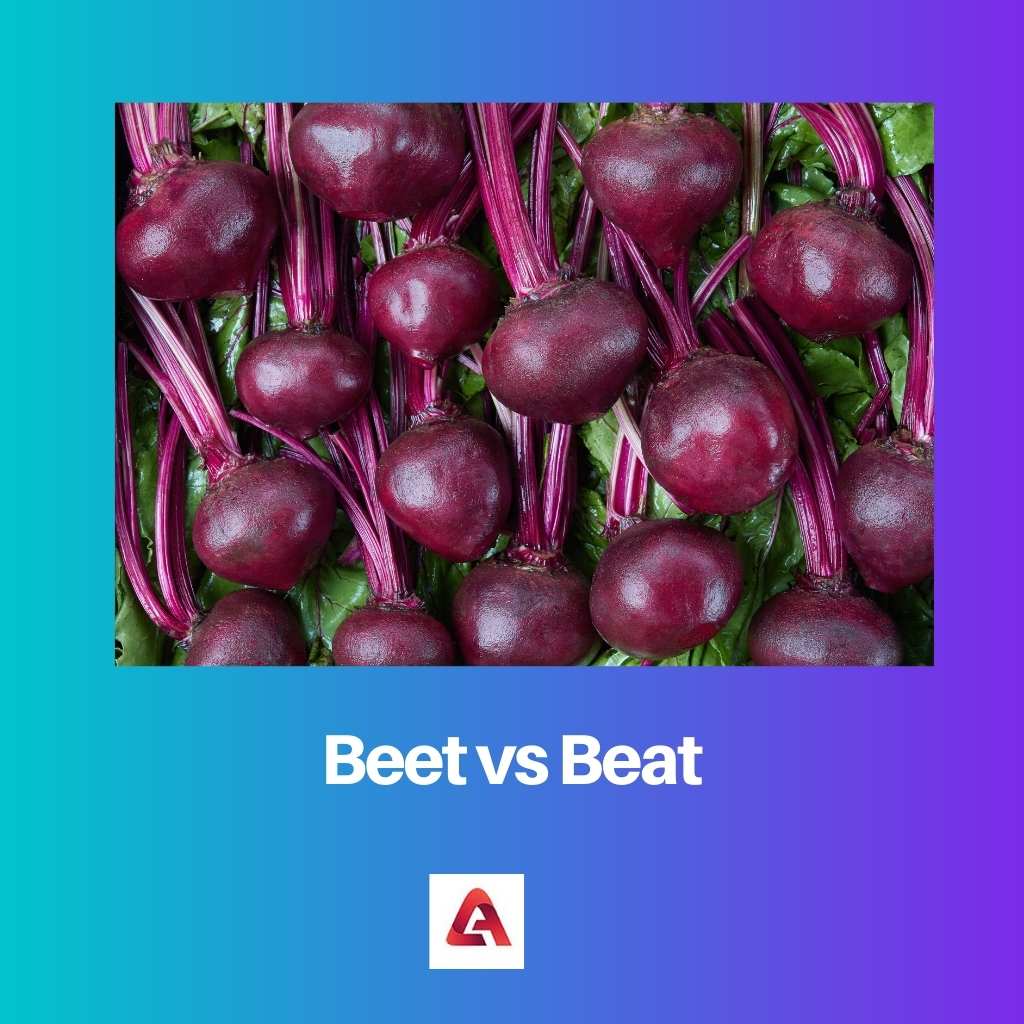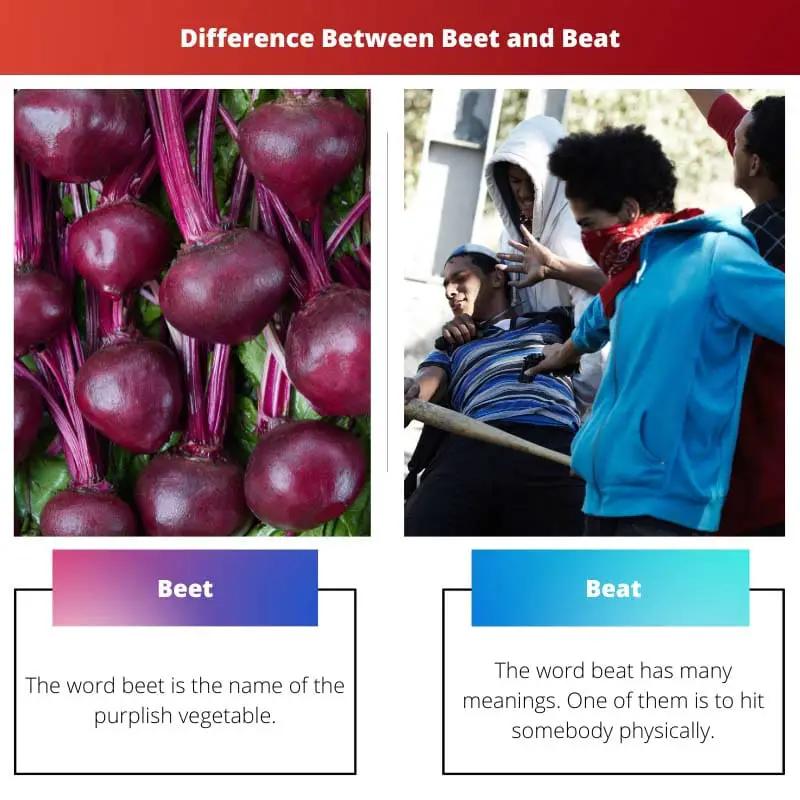We come across many words that are similar in sound but different in meaning and spelling. Such words are known as homophones.
The words beet and beat are two such phrases that have identical pronunciations. They are slightly different in spelling but are very distinct in meaning.
These words cannot be interchanged while used in a written context.
Key Takeaways
- Beets are root vegetables characterized by their deep red color, earthy taste, and high nutritional content, while “beat” is a verb meaning to strike repeatedly, win against, or create a rhythm or sound.
- Beet consumption offers various health benefits, such as improved blood pressure, enhanced athletic performance, and increased antioxidant levels, whereas the term “beat” has applications in sports, music, and other fields.
- Beets belong to the plant family Amaranthaceae, while “beat” is a versatile word with multiple meanings depending on the context.
Beet vs Beat
The difference between beet and beat is that beet means red-purplish root vegetable plants. On the other hand, beat means to hit somebody. Another meaning is to defeat somebody. Moreover, beet is a noun. However, beat can be a noun, an adjective, and a verb, depending on how one uses the English word beat.

The English term beet comes from the Dutch word in the sixteenth century. It’s the name of a flowering plant that was first grown in Europe.
It is a succulent root plant, and due to its sweetness, sugar was extracted from beet. It is a beneficial plant for every age group.
The English term beat can be a noun, verb, or informally it can be an adjective. The word has been derived from the proto German word since the 14th century.
It has multiple meanings in the English language. The popular ones are to strike somebody or to defeat someone.
Here it is a verb. The sound of the drum is also a beat.
Comparison Table
| Parameters of Comparison | Beet | Beat |
|---|---|---|
| Definition | The word beet is the name of the purplish vegetable. | The word beat has many meanings. One of them is to hit somebody physically. |
| Parts of Speech | The word beet is a noun. | The word beat can belong to different parts of speech (noun, verb, and adjective). |
| The trick to Remember | The word beet consists of letters double E between the letters B and T. | The word beat is the English letter B + Eat. |
| Invented In | The word beet has been invented in the 1590s. | The word beat has been known since 1300. |
| Example | She is fond of eating beet. | One should not beat anybody. |
What is Beet?
The word beet is an English word that has been derived from Dutch. This word is part of the English language since the 16th century.
Since beet is a noun, it is the plant’s name. The beet is red-purplish in hue.
It is a herbaceous root that is cultivated for humans and livestock. It is an extremely nutritious plant that also produces sugar.
It is spherical, and both the leaves and the fruit are good for us because leaves are also edible.
It can be consumed raw or cooked. Beet juice is available for consumption.
One can use beet as a dressing of the salads and snacks. Ancient people used beet as a lip color as it leaves a natural red hue.
Moreover, it is a popular ingredient in the cosmetic industry. Bakers also use beet as a natural color agent.
It’s a vegetable for purifying blood and internal glow.
It also manages blood pressure. Beets can be kept for a long time in vinegar.
Fiber, potassium, iron, and vitamin C are all abundant in this fruit. It’s also an excellent weight-loss vegetable.
So, it falls under the superfood.
Some individuals confuse the terms beat and beet. So, one should understand how to use the word beet correctly while writing it in a sentence.
For Example,
- I drink beet juice for glowing skin.
- We can make beet salad.

What is Beat?
The word beat is also English and can be interpreted in many forms. This word has been taken from proto German and has been part of English since the 1300s.
When the term beat is a noun, it means the sound produced on the drums or any other sound that creates a beat sound. The sentence we can make is
- He is playing beat sounds on his musical instruments.
Moreover, the word beat can be a verb that interprets some action. The second and third form of beat is beat and beaten, respectively.
It refers to hitting, slapping, or utilizing tools to strike someone or something.
The second meaning is to defeat somebody in challenges, games, races, etcetera. The other one is to aerate beverages such as coffee or whipped creams.
The sentences we can make are:
- Jo beats a hammer on the nail.
- Gini has beaten his sister.
- I will beat you.
- She beats coffee with sugar and milk before consuming it.
- Let’s beat whipped cream for cupcakes.
The phrase beat means striking the nail with a hammer in the first sentence. The word beaten in the second sentence refers to Gini hitting her sister.
The word beat in the third sentence means to defeat.
The phrase beat in the fourth sentence signifies aerating coffee, and in the fifth sentence, the word beat depicts to aerate the whipped cream.
If we use the phrase beat as an adjective, it means exhausted. The word beat as an adjective is for informal language. The sentence we can make is
- Jo is “beat”, let him rest.

Main Differences Between Beet and Beat
- The word beet is a noun. On the other hand, the word beat falls in three parts of speech (noun, verb, adjective).
- The word beat is formal. However, the word beat can be formal and informal as per the meaning.
- The word beet means a root vegetable cultivated for people and livestock. On the other hand, the term beat has numerous significances (striking, defeating, aerating beverages).
- In the 16th century, the word beet was added to the English language. On the other hand, the word beat was coined two centuries ago in the 14th century.
- The word beet has been taken from the Dutch. However, the word beat has been taken from proto German.

